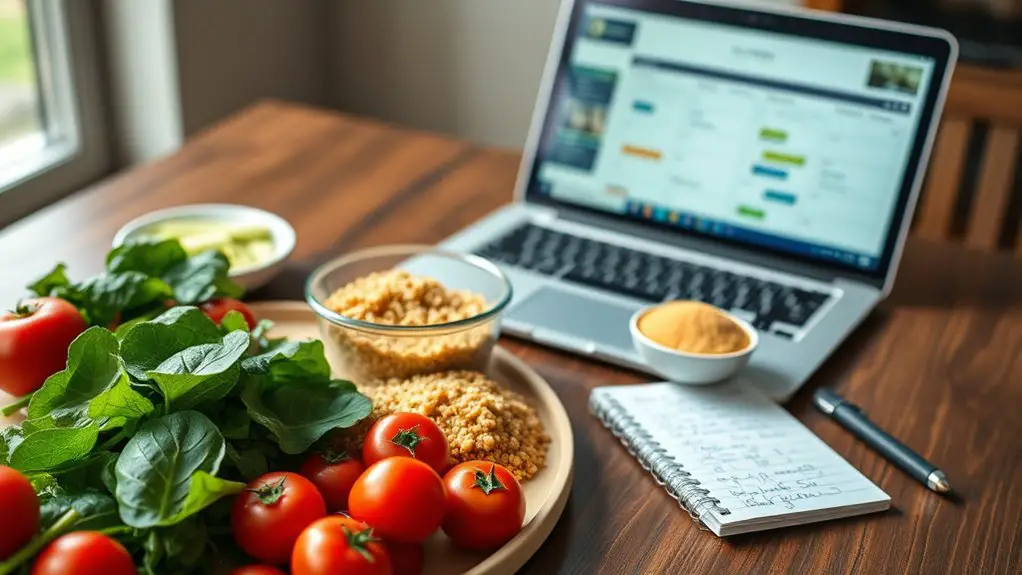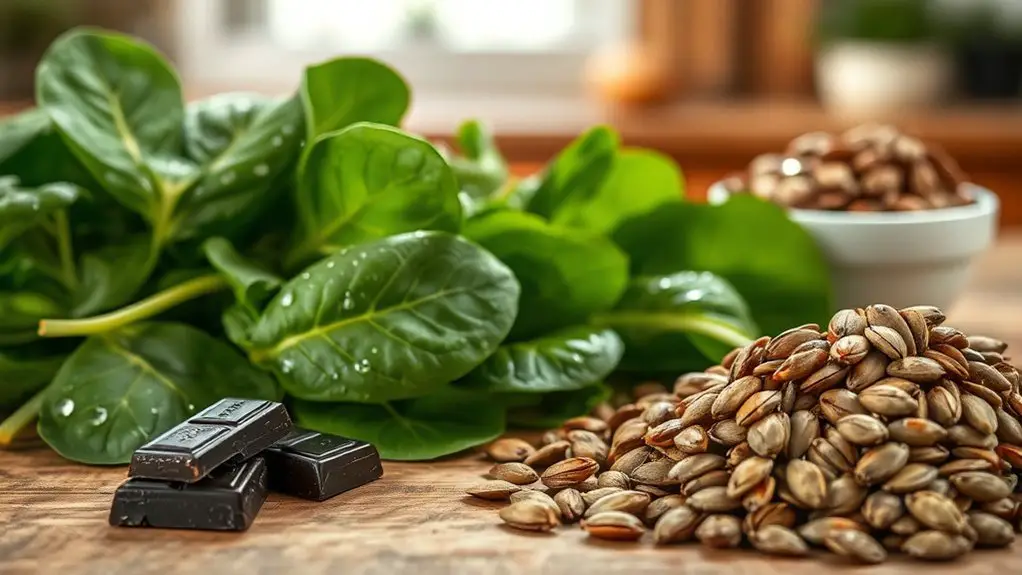To boost your recovery, focus on anti-inflammatory foods like berries, leafy greens, and fatty fish. Incorporate walnuts and chia seeds to enhance nutrition and energy levels. Don't forget the power of spices like turmeric and ginger, along with whole grains like quinoa and oats for sustained energy. Avocado adds creaminess while dark chocolate serves as a delightful treat. Stick around to discover even more delicious options that can aid your healing journey.
The Power of Berries
Berries are nature's tiny powerhouses, packed with antioxidants and nutrients that can aid in recovery. When you choose berries like blueberries, strawberries, or raspberries, you're giving your body a burst of vibrant health. Each bite is filled with vitamins that can combat inflammation and promote healing, allowing you to feel more energized and free.
Imagine enjoying a smoothie or a handful of fresh berries after a workout, knowing you're fueling your body with what it craves. Their natural sweetness satisfies your cravings without guilt, bringing you joy and energy. By incorporating these delightful fruits into your diet, you're not just treating yourself; you're empowering your body to recover faster and embrace the freedom of movement and life.
Leafy Greens That Fight Inflammation
While you may already know the benefits of fruits, don't overlook the power of leafy greens in your recovery journey. These vibrant veggies are packed with nutrients that can help fight inflammation and promote overall health. Here are three leafy greens you should include in your meals:
Don't underestimate leafy greens; they're essential for recovery, packed with nutrients to combat inflammation and enhance your health.
- Spinach: Rich in antioxidants and vitamins, spinach helps reduce inflammatory markers in the body.
- Kale: This hearty green is loaded with vitamins A, C, and K, all of which support immune function and reduce inflammation.
- Swiss Chard: High in polyphenols, Swiss chard can combat oxidative stress and inflammation, making it a great addition to your diet.
Incorporating these greens into your meals will empower your body to recover faster and feel better.
Fatty Fish: A Source of Omega-3s
If you're looking to enhance your recovery, incorporating fatty fish into your diet can be a game changer. These fish, like salmon, mackerel, and sardines, are rich in omega-3 fatty acids, which are known for their powerful anti-inflammatory properties. Omega-3s help reduce inflammation in your body, promoting faster healing and improved overall health. Plus, they can support joint function and heart health, giving you the freedom to stay active and feel your best. Adding these fish to your meals a couple of times a week can make a significant difference. Whether grilled, baked, or in a hearty stew, fatty fish not only taste great but also pack a nutritional punch that aids in your recovery journey. Enjoy the benefits!
Nuts and Seeds for Healing
Nuts and seeds are powerhouses of nutrition that can greatly aid in your recovery. They're packed with healthy fats, protein, and antioxidants, making them essential for healing. Incorporating them into your diet can help reduce inflammation and support your body's natural healing processes. Here are three great options to evaluate:
- Walnuts – Rich in omega-3 fatty acids, they can help lower inflammation levels.
- Chia Seeds – Loaded with fiber and antioxidants, they promote digestion and overall health.
- Almonds – High in vitamin E, they support immune function and protect cells from damage.
Add these nutrient-dense foods to your meals or snacks, and you'll be on your way to feeling better and more energized. Enjoy the freedom of nourishing your body!
Spices That Pack an Anti-Inflammatory Punch
When you're looking to enhance your recovery, incorporating spices into your meals can be a game-changer. These vibrant flavors not only elevate your dishes but also help fight inflammation, promoting a sense of well-being and freedom.
| Spice | Benefits |
|---|---|
| Turmeric | Contains curcumin, a powerful anti-inflammatory agent. |
| Ginger | Reduces muscle soreness and joint pain. |
| Cinnamon | Lowers inflammation and stabilizes blood sugar. |
| Cayenne | Boosts metabolism and reduces pain. |
| Garlic | Strengthens the immune system and fights inflammation. |
Whole Grains for Sustained Energy
Incorporating spices into your meals can greatly enhance recovery, but your body also needs the right fuel for sustained energy. Whole grains are a fantastic choice, providing essential nutrients and lasting power. Here are three whole grains to evaluate:
- Quinoa: Packed with protein and fiber, it keeps you full and energized.
- Brown Rice: A versatile staple that offers complex carbs for steady energy release.
- Oats: Rich in beta-glucans, they can help reduce inflammation while keeping your energy up.
Avocado: A Creamy Superfood
Avocado is more than just a creamy addition to your meals; it's a powerhouse of nutrients that can greatly aid in recovery. Packed with healthy fats, fiber, and antioxidants, this superfood supports your body's healing process. Here's a quick look at some of its benefits:
| Nutrient | Benefit | Source |
|---|---|---|
| Healthy Fats | Reduces inflammation | Avocados |
| Fiber | Aids digestion | Avocados |
| Potassium | Balances electrolytes | Avocados |
| Vitamins E & K | Protects cells, promotes healing | Avocados |
| Antioxidants | Fights oxidative stress | Avocados |
Incorporating avocados into your diet can be both delicious and beneficial. So go ahead, enjoy this creamy delight and feel the difference!
Turmeric: The Golden Spice
There's something special about turmeric that makes it a standout in the world of anti-inflammatory foods. This golden spice isn't just a vibrant addition to your meals; it's packed with powerful benefits. Here's why you should embrace turmeric in your diet:
- Curcumin Power: The active compound curcumin boasts potent anti-inflammatory properties, helping reduce pain and swelling.
- Antioxidant Boost: Turmeric fights oxidative stress, supporting your body's recovery and overall health.
- Versatile Use: You can easily incorporate turmeric into smoothies, soups, or even golden milk for a tasty health kick.
Dark Chocolate: A Delicious Treat
After exploring the wonders of turmeric, it's time to indulge in another delightful anti-inflammatory food: dark chocolate. Yes, you read that right! This rich treat isn't just a guilty pleasure; it's packed with antioxidants that can help reduce inflammation and improve heart health. When you opt for dark chocolate with at least 70% cocoa, you're not just savoring its deliciousness, but also reaping the benefits of flavonoids that combat oxidative stress. Enjoy it in moderation, and you'll be doing your body a favor while satisfying your sweet tooth. So go ahead, treat yourself to a square or two. You deserve this indulgence as part of your journey to recovery and well-being!
Frequently Asked Questions
How Do Anti-Inflammatory Foods Benefit Overall Health?
Anti-inflammatory foods can boost your overall health by reducing chronic inflammation, improving heart health, and enhancing immune function. You'll feel more energetic, experience less discomfort, and enjoy a greater sense of well-being in your daily life.
Can I Combine Different Anti-Inflammatory Foods?
Absolutely, you can combine different anti-inflammatory foods! Mixing them not only enhances flavors but also boosts their health benefits. Experiment with various combinations to find what works best for your taste and wellness goals. Enjoy!
Are There Any Anti-Inflammatory Foods to Avoid?
While you're embracing a healthy lifestyle, avoid processed foods, sugary snacks, and trans fats. They can trigger inflammation and undermine your efforts to feel your best. Keep your plate vibrant and wholesome!
How Long Does It Take to See Results From These Foods?
You might start noticing changes within a week or two, but everyone's different. Factors like your diet, lifestyle, and overall health can affect how quickly you see results. Patience is key in this journey!
Is There a Recommended Daily Intake for These Foods?
For fantastic fuel, you don't need a fixed formula. Instead, focus on incorporating a variety of vibrant veggies and wholesome grains into your daily diet. Balance is key; listen to your body's unique needs!




